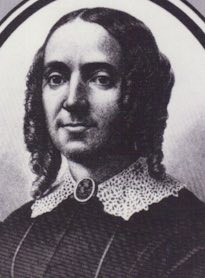Ernestine Rose, often cited by Susan B. Anthony as one of the early influential leaders of the women’s suffrage movement was born in a ghetto in Russian Poland. She inherited substantial property at the death of her mother. As was the custom, her father assigned Rose and her dowry in marriage to a man his age, although her refusal to consent to the marriage was quite controversial.
Instead, Rose successfully persuaded Polish officials to grant her authority over her inheritance. In 1827, she left Poland, traveled across Europe, and married William Rose. The couple emigrated to the United States in 1836.
Settling in New York, she took up the cause of the married women’s property bill that had been introduced in the State Legislature. In 1840, along with Paulina Wright Davis and Elizabeth Cady Stanton, Rose circulated petitions and spoke in support of the bill before a legislative committee in Albany. Because of strong opposition, twelve years elapsed before a limited version of the bill passed both houses of the Legislature.
During the 1850’s, Rose focused her efforts on women’s rights. In 1850, she attended the first national women’s rights convention in Worcester, Massachusetts, where she introduced a resolution calling for “political, legal and social equality with man.” For the next 20 years, she attended most national and state conventions and was frequently a recognized speaker. She lectured in more than twenty states, addressing legislative bodies on the issues of antislavery, temperance and freedom of thought, as well as women’s rights. Her oratorical prowess led to her title, “Queen of the Platform.”
During the Civil War, Rose found herself again in the company of Stanton as they worked together in the Women’s Loyal National League and later in the American Equal Rights Association. In 1869, the pair, along with Susan B. Anthony, took the lead in transforming the Equal Rights Association into the National Women’s Suffrage Association, an organization critical to the success of the women’s suffrage movement in 1920.

